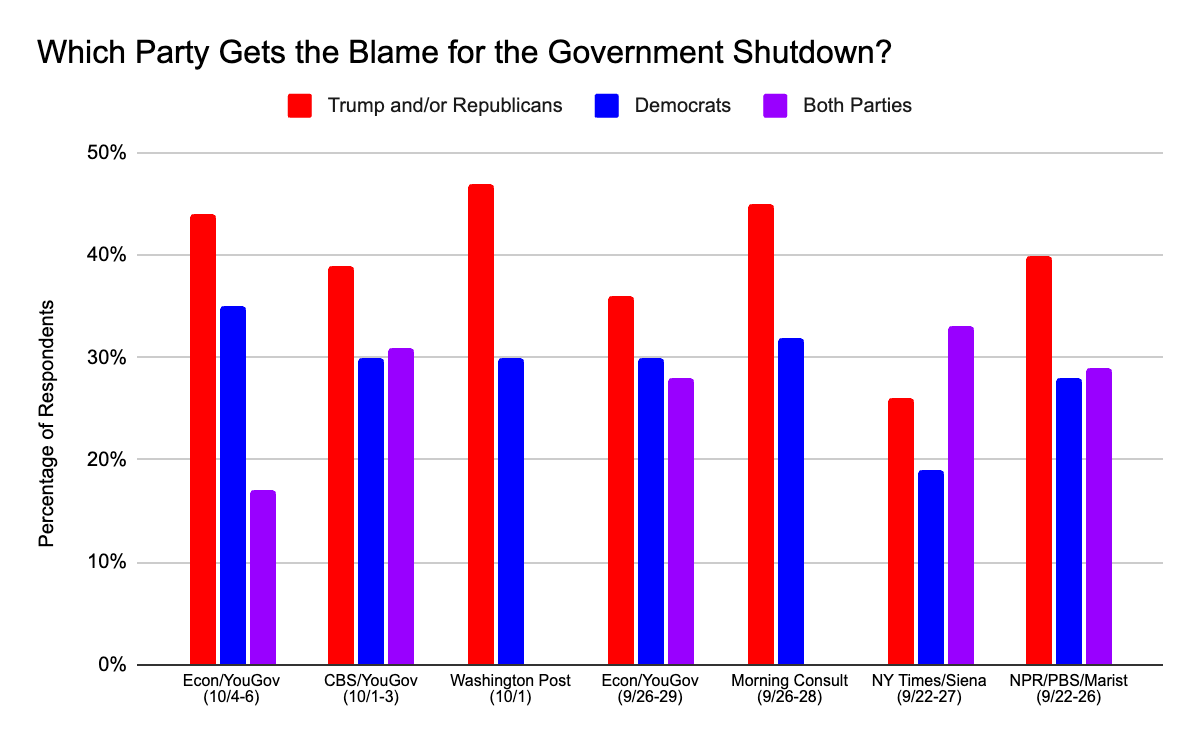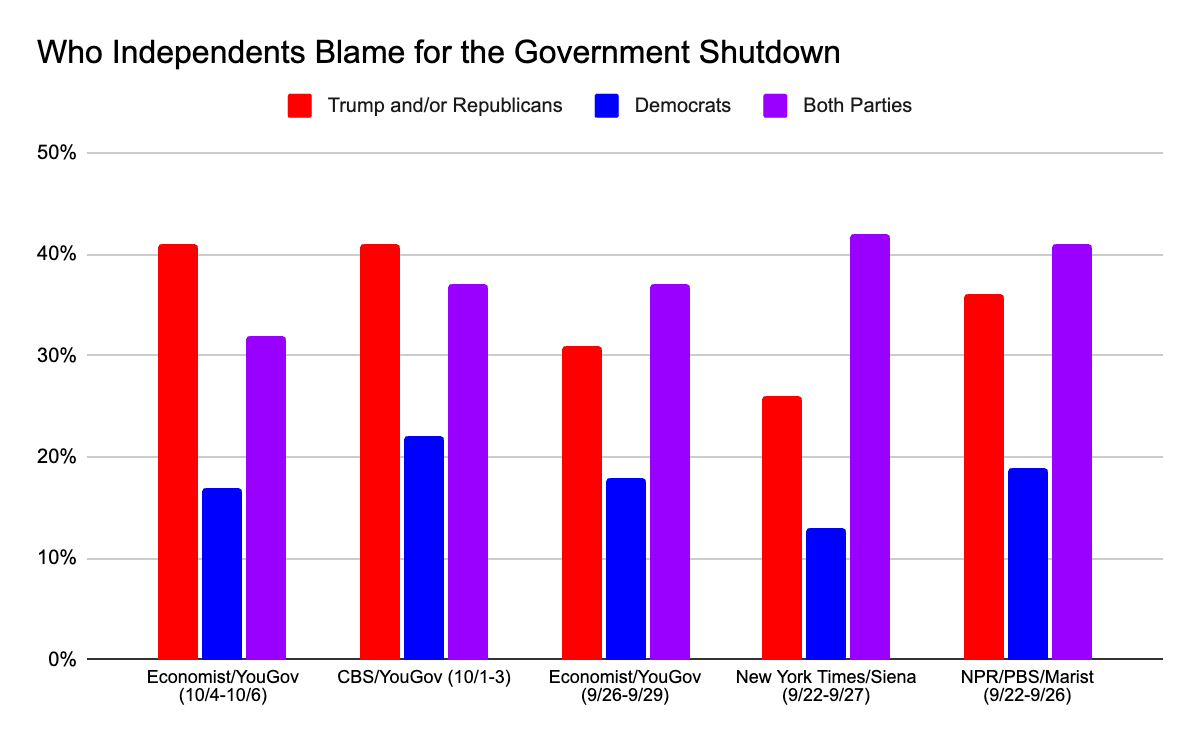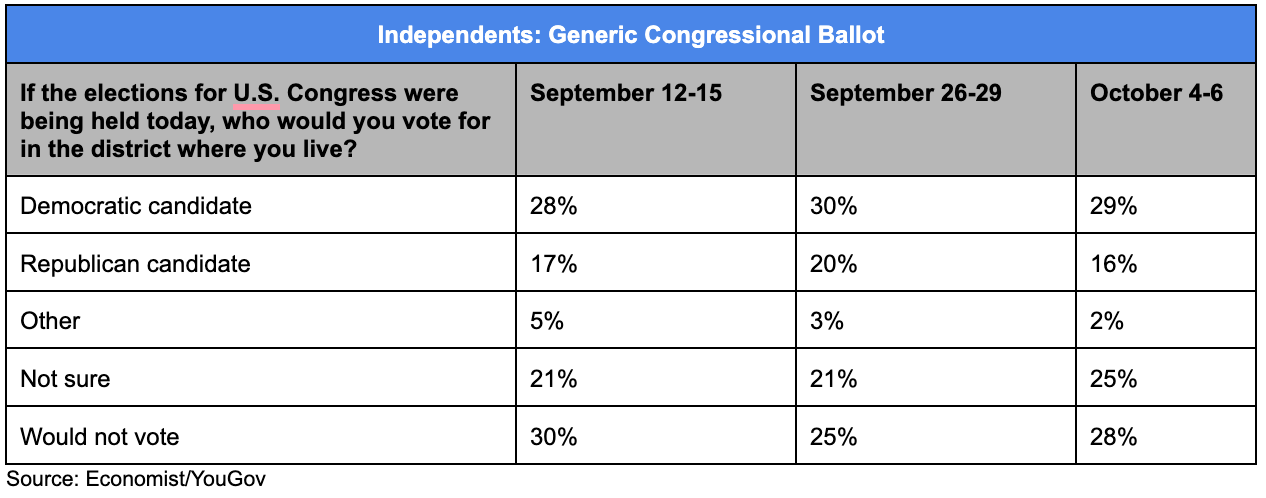Republicans Are Getting More Blame for the Shutdown Than Democrats
Independents are annoyed with both parties
Congress is now seven days into a government shutdown, and we’re beginning to get a better sense of where Americans, including registered voters, are assigning blame. On Saturday, according to Punchbowl, Speaker Mike Johnson (R-LA) said that “he believes the GOP is winning the messaging fight on the shutdown.” Based on the public polling,1 the statement is a head-scratcher. Right now, fairly or not, Republicans and Trump are getting more blame than Democrats.2
Overall, yes, Republicans are generally getting a plurality of the blame. That’s not to say that Democrats are completely escaping blame or that Americans aren’t shifting their opinions on blame. For example, The Economist/YouGov survey conducted from September 26 to September 29 showed that 36 percent of registered voters blamed Republicans while 30 percent blamed Democrats. Another 28 percent blame both parties equally. The latest Economist/YouGov survey, conducted from October 4 to October 6, shows that the share of voters blaming Republicans has increased to 44 percent (+8 over the previous survey) while the share blaming Democrats has risen to 35 percent (+5). The voters who blame both parties dropped substantially, down to 17 percent (-11).
The Washington Post survey had the largest percentage of Americans blaming Republicans, at 47 percent, while 30 percent blamed Democrats. The survey didn’t ask if both parties deserve blame. I do think pollsters should ask that question because, generally, there’s a sizeable share of Americans who are frustrated by Congress’s inability to effectively govern, and they blame both sides for it.
Although the polling in the chart below includes polls conducted before the shutdown, sentiment after the shutdown began is probably the best.3 That’s because the shutdown is no longer a hypothetical, and more Americans are likely paying attention to it because of the increased amount of content they’re seeing about it on various platforms, including traditional media and social media.
Now, I’ve noted before that partisans immediately huddle in their corners and blame the other side. That’s not a surprise.4 Self-identified independents are really the group to watch as the shutdown progresses, if it continues. Right now, the results among independents are mixed. If you’re looking for specific partisan blame, Republicans are getting more than Democrats, and it’s not really close. However—and you can’t ignore this key data point—a sizeable percentage of independents are blaming both parties for the shutdown. In about half the polls I’ve seen, “both sides” get a plurality of the blame.
What does that mean? In the grand scheme, it may not mean much. Consider the generic congressional ballot in The Economist/YouGov surveys. Democrats haven’t benefited from the shutdown. Republicans have lost some ground. There are two notable data points. The first is that more independents have shifted to “not sure”—from 21 percent to 25 percent—when asked who they’ll vote for in their district. The second is that more independent voters wouldn’t vote. I’m using the survey conducted from September 12 to September 15 as a control.
Again, opinions may shift the longer the shutdown goes. Granted, I’ll argue that Johnson’s decision to cancel votes this week is a bad look. The posture that Senate Majority Leader John Thune (R-SD) has taken—by which I mean his unwillingness to negotiate with Democrats—could backfire. Still, their argument that the continuing resolution passed by the House would reopen the government is one with which Democrats will have to contend, because it’s completely true. But Democrats are understandably distrustful of the Trump administration and congressional Republicans because of what they’ve seen in the past several months. Democrats have put themselves in a “no-win” position, but they don’t have to win,5 per se; they just need not lose. Right now, Democrats aren’t losing.
Perhaps the only surprise is the degree to which they’re doing it today compared to in the past.
As I mentioned in my previous post on the subject, I don’t really think it matters who wins the messaging war on the government shutdown. Voters will long have forgotten the shutdown by November 2026 and will likely pay more attention to issues like the economy and inflation than a government shutdown that happened 14 months before.
The data in the chart come from a mix of surveys that gauged sentiment from adults and registered voters. I tried to get data for registered voters where it was available. Only CBS/YouGov and the Washington Post include only adults. Everything else is registered voters. I hope that makes sense.
Perhaps the only surprise is the degree to which they’re doing it today compared to in the past.
Democrats have postured so much on healthcare that not getting anything, even an agreement to have votes on extending the enhanced premium tax credits, would be a loss.





